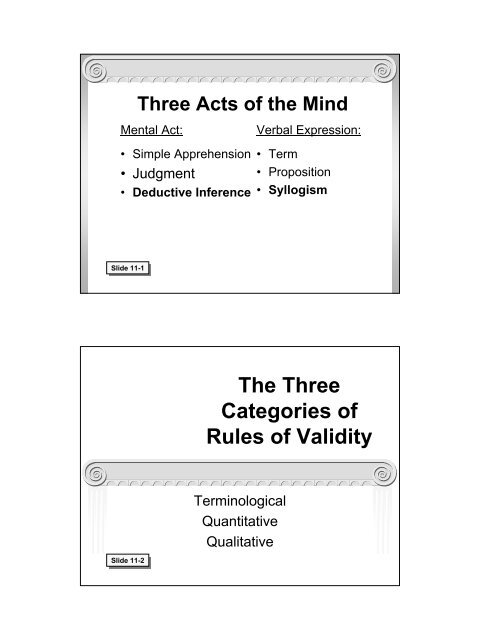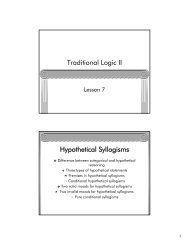Traditional Logic I Chapter XI - Memoria Press
Traditional Logic I Chapter XI - Memoria Press
Traditional Logic I Chapter XI - Memoria Press
Create successful ePaper yourself
Turn your PDF publications into a flip-book with our unique Google optimized e-Paper software.
Three Acts of the Mind<br />
Mental Act:<br />
• Simple Apprehension<br />
• Judgment<br />
• Deductive Inference<br />
Verbal Expression:<br />
• Term<br />
• Proposition<br />
• Syllogism<br />
Slide 11-1<br />
The Three<br />
Categories of<br />
Rules of Validity<br />
Terminological<br />
Quantitative<br />
Qualitative<br />
Slide 11-2
Terminological<br />
Rules of<br />
Validity<br />
I. There must be three and only<br />
three terms.<br />
II.<br />
The Middle Term must not occur<br />
in the conclusion.<br />
Slide 11-3<br />
Quantitative<br />
Rules of<br />
Validity<br />
III. If a term is distributed in the<br />
conclusion, then it must be<br />
distributed in the<br />
premises.<br />
VI.<br />
Slide 11-4<br />
The middle term must be<br />
distributed at least once.
Qualitative Rules of Validity<br />
V. No conclusion can follow from<br />
two negative premises.<br />
VI. If the two premises are<br />
affirmative, the conclusion must<br />
also be affirmative.<br />
VII. If either premise is negative,<br />
the conclusion must be negative.<br />
Slide 11-5<br />
Terminological Rules of<br />
Validity<br />
I. There must be<br />
three and only<br />
three terms.<br />
Slide 11-3<br />
II.<br />
The Middle Term<br />
must not occur in<br />
the conclusion
Terminological<br />
Rules<br />
Rules I and II are terminological<br />
rules because they have specifically<br />
to do with the terms in the<br />
syllogism.<br />
Slide 11-6<br />
Rule I: There<br />
must be three<br />
and only three<br />
terms<br />
A syllogism must have three terms<br />
a major, minor and middle term.<br />
Each one will appear twice in the<br />
syllogism.<br />
Slide 11-7
The Fallacy of<br />
Four Terms<br />
The Fallacy of Four Terms occurs<br />
when there are more than three<br />
clearly distinguishable terms.<br />
Slide 11-8<br />
The Fallacy of Four<br />
Terms<br />
All mammals have hair<br />
All horses have manes<br />
Therefore, some horses have hair<br />
Slide 11-9
The fallacy fixed<br />
All mammals have hair<br />
All horses are mammals<br />
Therefore, some horses have hair<br />
Slide 11-10<br />
The Fallacy of Equivocation<br />
The Fallacy of Equivocation occurs<br />
when there is an ambiguous<br />
middle term. It also results in<br />
more than three terms, but the<br />
additional term usually looks the<br />
same as one of the other terms.<br />
Slide 11-11
The Fallacy of Equivocation<br />
All planes are two-dimensional<br />
All 747s are planes<br />
Therefore, all 747s are two-dimensional<br />
Slide 11-12<br />
The Fallacy of Equivocation<br />
All planes are two-dimensional<br />
All 747s are planes<br />
Therefore, all 747s are two-dimensional<br />
Slide 11-13
The Fallacy of Equivocation<br />
(Example II)<br />
Mortal is not a three-letter word<br />
Man is a three-letter word<br />
Therefore, no man is mortal<br />
Slide 11-14<br />
Terminological Rules of<br />
Validity<br />
I. There must be<br />
three and only<br />
three terms.<br />
Slide 11-15<br />
II.<br />
The Middle Term<br />
must be distributed<br />
at least once.
Rule II: The middle term<br />
must not occur in the<br />
conclusion<br />
All plants are living things<br />
All animals are living things<br />
Therefore, all living things are plants or animals<br />
Slide 11-16<br />
Terminological<br />
Rules of<br />
Validity<br />
I. There must be three and only<br />
three terms.<br />
1. The Fallacy of Four Terms<br />
2. The Fallacy of Equivocation<br />
II. The Middle Term must be<br />
distributed at least once.<br />
Slide 11-17
















